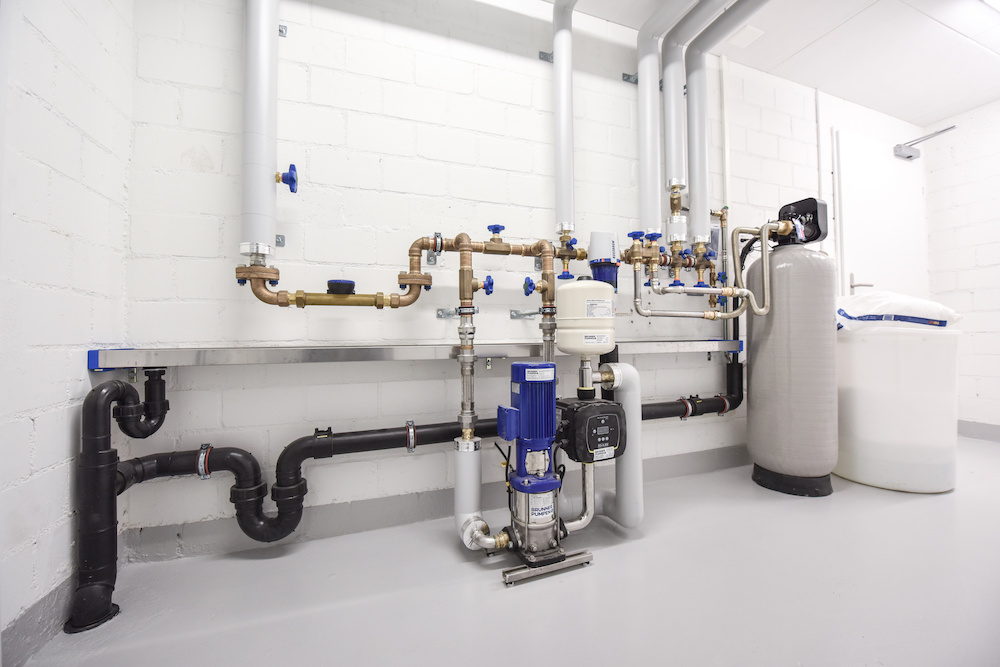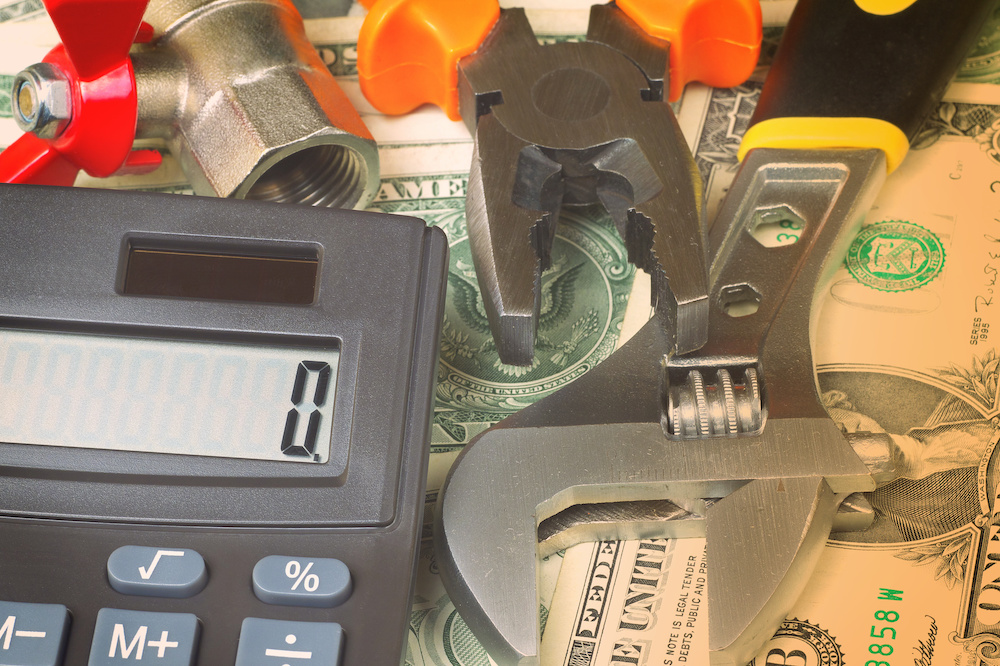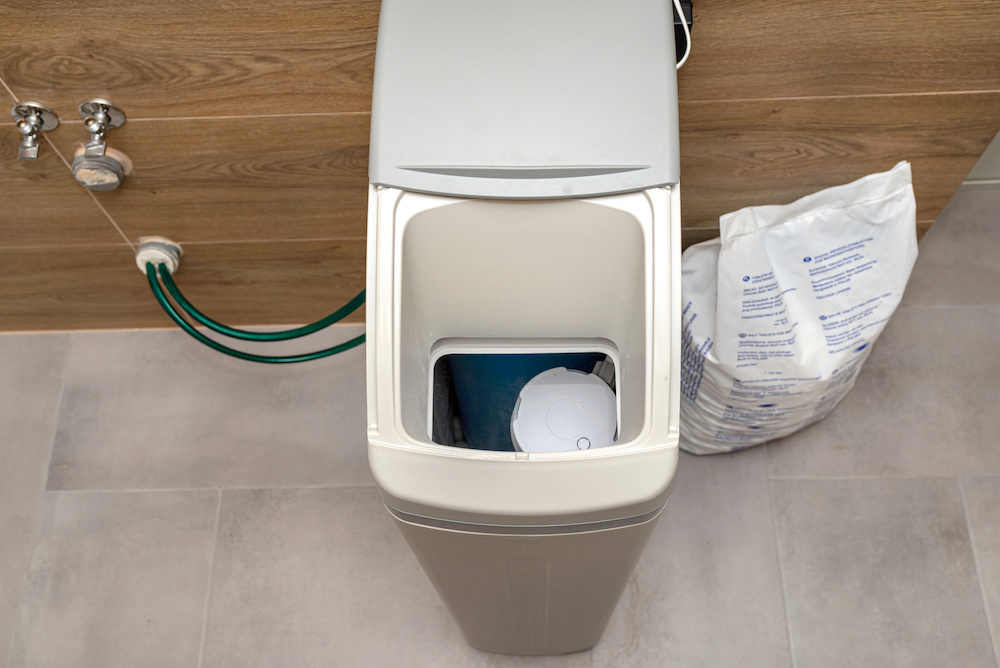Hard water leaves behind mineral deposits that wreak havoc on various home appliances. Fortunately, water softeners were invented to address this issue. The problem is that the cost of installing one can set you back anywhere from $500 to $3,000.
To get the most bang for your buck, we’ll talk about the factors that influence the cost of a water softener from installation to upkeep, the many different types available, and the best brands making waves in the market.
Taking it a step further, we’ll also list proper water softener maintenance tips so you can finally bid farewell to stubborn limescale once and for all!
- Factors Affecting the Cost of a Water Softener
- Types of Water Softeners and Their Costs
- Brands and Their Prices
- Water Softener Installation Costs
- Additional Costs
- Maintenance and Repair Costs
- Salt or Media and Parts Replacement Costs
- Warranty and Extended Warranty Costs
- Cost-Saving Strategies When Using a Water Softener
- Water Softener Rental and Leasing Costs
- FAQs
- 1. What is the average cost of a water softener?
- 2. How long does a water softener last?
- 3. Can I install a water softener myself?
- 4. Do all water softeners require salt?
- 5. Can a water softener improve the taste of my water?
- 6. Do I need a water softener if I have well water?
- 7. What happens if I don’t use a water softener?
- 8. Is it safe to drink water from a water softener?
- 9. How often should I replace the resin in my water softener?
- 10. What is the warranty on a typical water softener?
- The Cost of Owning a Water Softening System
Factors Affecting the Cost of a Water Softener
Are you tired of battling stubborn water stains? Fed up with appliances that give out way faster than they’re supposed to? If so, you definitely need a water softener. But before you take the plunge, it’s important to dive into the nitty-gritty details of cost.
To help you choose a water softener that not only fits your needs but also saves your hard-earned cash, make sure to consider the following:
Size of the Unit
When it comes to water softeners, size does matter. Deciding on the right water softener size hinges on several factors, including water hardness level, household size, and water usage.
Obviously, larger households that demand more water supply and those homes in areas with extremely hard water need a beefier water softener. If you do find out that you need a bigger unit, expect to pay a heftier price.
Type of Water Softener
Choosing a water softener is like picking the perfect partner for your home. Basically, you have two options: salt-based and salt-free softeners.
The former boasts advanced tech and that silky soft water feel, but it comes at a higher upfront cost and requires regular salt replenishments. The latter, salt-free systems, are easier on the wallet at first, maintenance costs can creep up over time. However, they are not technically considered a water softener as they do not use ion exchange to remove the hardness minerals.
Type of Resin
For salt-based softeners, the resin is the magic ingredient that filters out hard minerals from the water. The catch? You will need to invest in a high-quality resin to ensure the best results. This is typically determined by the water softener brand you go with.
Obviously, a higher-quality resin comes with a higher price tag, but it is worth the investment. Why? Simply because it works better, lasts longer, and helps your water softener withstand the test of time.
Brand
Trusted brands boast reliability and advanced tech, but they will cost you a pretty penny. That said, you can also find budget-friendly and good-quality options from lesser-known brands if you search hard enough and do comparative research.
The key is to look at different models, specifications, and warranties, read customer reviews, and compare prices to find the right balance between cost and performance.
Installation
Installing a water softener is like tackling a puzzle. Some need pros for their technical demands, adding to the cost. Others are DIY-friendly, saving you bucks if you’re handy enough. However, work done by the pros is usually guaranteed, whereas your own work won’t be, and some softener warranties may be dependent on professional installation.
Additional Features
Modern water softeners come with additional features that enhance their functionality or convenience. Think digital controls, smart regen cycles, and even WiFi connectivity for remote control.
That said, these extras will surely increase the cost. It’s important to know your must-haves and nice-to-haves so that you don’t splurge on features that you won’t use.

Types of Water Softeners and Their Costs
Ready to upgrade the quality of your water? To help you get started on the right track, let’s dive a little deeper into the different types of water softeners.
Salt-Based Water Softeners
Salt-based water softeners work their magic through a process called ion exchange. Picture a resin tank filled with tiny beads doing the work for you. They snatch away calcium and magnesium ions from the water.
Salt-Based Soft Water Systems Cost
On average, these systems can cost somewhere between $500 and $2,500, but that may already includes installation fees. If you need a larger unit or one with advanced features, you will most likely be paying more.
Pros:
- Removes hard minerals effectively
- More affordable upfront costs
- Proven track record of reliability
- Can handle high water flow rates with ease
Cons:
- Needs regular salt replenishments
- Cost of salt and maintenance can accumulate over time
- Requires ample space for the resin/salt tank(s) and access for a drain line
Salt-Free Water Softeners
Instead of using salt, salt-free water softeners use template-assisted crystallization, catalytic media, or magnetic fields to neutralize minerals in the water without actually removing them.
Also called water conditioners or descalers, they technically don’t soften the water. Instead, they help prevent mineral buildup and effectively reduce scaling.
Salt-Free Water Softener System Cost
With a salt-free water softener, you can expect to pay $500 to $1,500 for the unit and installation. While more budget-friendly upfront, you will have to budget for long-term maintenance costs because it needs regular media replenishment every 3 to 5 years.
Pros:
- Ideal for health-conscious individuals
- Requires little maintenance
- Does not require electricity
- Compact size is perfect for homes with limited space
Cons:
- Not recommended for well water due to other minerals that clog the media making it inert
- May not achieve the same level of water softness as salt-based systems
- Does not completely remove hardness minerals from the water
Dual-Tank Water Softeners
As the name suggests, a dual-tank water softener has two resin tanks, making it ideal for stubborn hard water and homes with heavy water usage. Since it alternates regeneration cycles, you’ll have an uninterrupted flow of softened water.
Dual-Tank Whole House Water Softener Cost
Because of its dual-tank setup, this type of water softener is larger and therefore pricier than single-tank systems. Including installation, you might need to shell out anywhere from $1,500 to $4,000.
Pros:
- Provides a continuous soft water supply, no downtime
- Ideal for larger households or businesses with high water demands
- Efficiently manages soft water usage requirements
Cons:
- Higher initial cost compared to single-tank systems
- Requires more space for installation
- May require professional installation and maintenance
Magnetic and Electronic Water Softeners
If you want a water-softener that doesn’t use chemicals, check out magnetic and electronic water softening systems. They use magnets or electrical currents to change the structure of minerals in the water, so you won’t need to spend money for salt or media replacements.
Magnetic and Electronic Water Softener System Price
With upfront costs ranging from $200 to $1,000, those on a budget will benefit from magnetic and electronic water softeners. However, their long-term effectiveness and maintenance costs may vary.
Pros:
- Does not require plumbing modifications or ongoing maintenance
- Compact and electricity-free
- Low-cost and environment-friendly
Cons:
- Limited scientific evidence supporting their efficacy
- Not ideal for areas with extremely hard water

Brands and Their Prices
Shopping for a water softener is not a walk in the park. Your choice affects not only the performance and reliability of the system but also how long your household can enjoy its services.
To make the right choice, take the time to research and compare different models from various brands. No idea where to start? Let us help you with that.
Most Popular Water Softener Brands
To help you find the perfect fit, here are some of our favorite brands and the expected price of their water softener systems:
Fleck
Fleck is well-known in the water treatment industry. Its systems boast durability and advanced control valves, which help ensure precise regeneration cycles and efficient water usage. Fleck water softener systems typically range from $500 to $2,000.
Culligan
Culligan is another trusted name known for their impressive line of salt-based and salt-free water softeners. Culligan water softening systems are often praised for their performance, user-friendly controls, and excellent customer service. Prices generally range from $1,000 to $3,500.
GE Appliances
GE manufactures all kinds of home appliances, including water softeners. Not only are their options reliable and efficient but also have innovative features like WiFi connectivity. That said, a water softening system from GE can cost anywhere from $400 to $1,500.
Price Comparison of Different Brands
Here is a general price comparison of different brands:
| Price Range | Brand | Features |
| $500 to $1,000 | Whirlpool, Morton, Kenmore, GE Appliances | Basic, entry-level units |
| $1,000 to $2,500 | Fleck, Culligan, Aquasana | Additional features and higher capacity |
| $2,500 to $4,000 | Kinetico, EcoWater Systems | Advanced features and premium quality |
Features Offered By Different Brands
Water softener brands stand out by offering features that boost performance, convenience, and efficiency for a relatable experience. Here are some features you’ll want to keep an eye out for:
- Smarter Regeneration Cycles: Brands now use advanced regeneration cycles that optimize salt and water usage, saving resources and reducing maintenance.
- Digital Convenience: User-friendly digital controls from Fleck and GE Appliances make programming and customizing water softener settings a breeze.
- Remote Connectivity: In this day and age, staying connected is the name of the game. And with WiFi-ready water softeners, you can monitor and control the system using your smart devices.
- High Demand Solutions: If your household requires a higher supply, get a high-capacity water softener from brands like Culligan and Kinetico.
- Intelligent Sensing: A water softener with smart sensors lets you keep tabs on your household’s water usage. It will also adjust regeneration cycles based on your needs to ensure efficient operation.
- Space-Saving: Short for space? Look for water softeners with compact, space-saving designs without compromising performance.
Water Softener Installation Costs
Installing a water softener properly not only ensures the best performance but also helps extend the system’s lifespan. Do you think you can do it on your own, or is it something that requires the help of a professional plumber? Let’s find out.
DIY vs. Professional Installation
While deciding whether to DIY it or hire a pro is important, your main goal should be getting it done the right way to avoid potential issues down the road.
If you do decide to do it your way, make sure you have the skills and the right tools. More importantly, follow the manufacturer’s installation guide to avoid any hiccups and voiding the warranty.
On the other hand, getting expert help from a professional plumber will give you peace of mind. You could be paying $200 to $600, but asking for quotes from different plumbers is the key. Remember to ask about any extra fees, too.
Another option is installation by a dealership. The store where you buy your softener may also do the installation for you. It will be included in the price they quote you.
Additional Costs
Aside from the installation itself, here are some potential additional costs to consider:
Electrical Work
Water softener models with digital controls or timers will require an electrical outlet. If one isn’t availabe in the vicinity, you’ll probably need an electrical connection. If yours does, it’s a good idea to hire an electrician to help with your project. Costs will vary depending on the job’s complexity and your location.
Permits
Depending on where you are located, you might need to secure a permit to install a water softener. Check with your local building department to determine if you need one and inquire about the associated fees.
Plumbing Modifications
Before you can install a water softener, you may need to reroute pipes or add shut-off valves. Even if you’re confident about your DIY skills, it’s best to leave these things to the professionals.

Maintenance and Repair Costs
Knowing how much to spend on maintenance will help you plan and budget effectively. To give you an idea, here are maintenance, repair, and warranty considerations to keep in mind:
Regular Maintenance Costs
The type of water softener you have and the manufacturer’s recommendations will determine your system’s cleaning and maintenance costs.
For example, you will most likely need to buy cleaning and maintenance supplies like resin cleaners and filter cartridges. The costs vary, but budgeting around $50 to $100 a year should do it.
Repair Costs
Over time, your water softening system may need repairs. There’s no telling how much you need, as it will depend on the issue, required replacement part, and the going rate of the service provider.
For instance, a control valve can range from $200 to $500. So, quality matters in the long run. Keep this in mind when budgeting for your water softener system.
Salt or Media and Parts Replacement Costs
In addition to maintenance and repair expenses, allocate funds for routine salt or media replacements and parts changes.
Salt or Media Replacement
If you have a salt-based water softener, you will need to budget for regular salt replenishment. How often you do it depends on usage demands and unit size, costing $50 to $150 per year on average.
On the other hand, salt-free softeners may need media replacement every 3 to 5 years, which may set you back around $100 to $200.
Motor or Pump Replacement
Most water softeners can work off of the municipal water supply’s pressure. Some applications may need a pump. You may need to replace the motor or pump of your water softener over the lifetime of your softener. The cost depends on the type and model of your system, but allocating around $200 to $500 is a reasonable estimate.
Warranty and Extended Warranty Costs
As with any investment, remember to check your water softener’s warranty. In general, you’ll get a standard coverage of one to five years, but it only covers specific parts and labor.
For more peace of mind, you can ask for an extended warranty to protect you from unexpected repairs. However, you’ll most likely need an additional $100 to $300 for this. Make sure you review the terms carefully.
Cost-Saving Strategies When Using a Water Softener
As a homeowner, finding cost-saving strategies in every aspect will provide long-term value. Here are some tips to help you save money while still enjoying the benefits of your water softening system:
Choose a cost-effective unit.
The best water softeners boast the perfect balance between affordability and performance. Make sure you prioritize value over the cheapest option by researching the best brands, comparing prices, and reading user reviews.
Opt for DIY installation.
You can save costs by considering DIY installation, but only do it if you have the skills and tools necessary. Otherwise, you could end up with more problems than when you started. If you’re unsure, seek professional assistance for your peace of mind.
Practice regular maintenance and upkeep.
Follow the manufacturer’s guidelines, like cleaning the resin tank and checking salt or media levels regularly. This proactive approach prevents future problems, extends the lifespan of your system, and saves you from costly repairs and frequent service calls.
Prioritize energy-efficient models.
You can save on electricity costs if you choose energy-efficient water softeners. Pick one with a programmable timer or smart technology for customized regen cycles and usage optimization. At the same time, ask for certifications to ensure its efficiency.
Water Softener Rental and Leasing Costs
Renting or leasing a water softener means you can enjoy the perks of having one while also maintaining flexibility in your choices. If you follow this route, you won’t have to worry about making a significant upfront payment and you may not have to pay for installation fees.
It’s like having the best of both worlds—getting the water softener you need, precisely when you need it but without any strings attached!
Monthly Rental Costs
Renting a water softener has an average monthly cost of only $25 to $50. You may be asked to pay an upfront deposit or installation fee, though, so clarify all costs and terms beforehand.
Lease Agreement Terms
Lease agreement terms can differ among companies, spanning from one to five years. To make the best choice, take note of cancellation policies, maintenance, repair provisions, and the possibility of purchasing the system at the lease’s end.
Pros and Cons of Renting or Leasing
Of course, there are advantages and disadvantages to leasing or renting water softening systems. Understanding what these are will help you decide whether it’s the best option for you.
Pros:
- Low Upfront Costs: As mentioned, this approach requires minimal upfront costs compared to purchasing a system outright. Because of this, it’s the perfect choice for those on a budget or seeking a lower investment.
- Flexibility: Compared to buying one, renting or leasing offers flexibility. You can easily upgrade or switch to a different system if your needs change or if you move to a different location.
- Maintenance and Repairs: Rental agreements often come with maintenance and repair services, too. This saves you from potential additional expenses and the hassle of finding a reliable service provider.
Cons:
- Long-Term Costs: While monthly rental costs may seem affordable at first, they can accumulate over time. In some cases, it may even exceed what you would’ve paid if you bought a water softener.
- Limited Ownership: Obviously, renting or leasing means you don’t have ownership of the system. Hence, you may be unable to customize or modify the unit to meet your preferences.

FAQs
1. What is the average cost of a water softener?
While the cost depends on the type, brand, size, and additional features, you can expect to pay anywhere from $500 to $3,000 or more, including installation fees.
2. How long does a water softener last?
With regular maintenance and proper upkeep, a good-quality water softener can last 10 to 20 years. Make sure you follow the manufacturer’s usage guidelines to extend its lifespan.
3. Can I install a water softener myself?
It’s possible to install a water softener yourself if you have the necessary tools, skills, and enough confidence in your abilities. If in doubt, do not hesitate to hire a professional plumber to do it for you.
4. Do all water softeners require salt?
Yes, it is not technically a water softener if it does not require salt. Salt-free water “softeners”, such as template-assisted crystallization (TAC) systems or electronic water conditioners, use alternative methods to reduce the effects of hard water without using salt.
5. Can a water softener improve the taste of my water?
While water softeners can improve the feel of the water and prevent limescale, they do not directly impact the taste of the water. That said, some systems may have additional filtration or conditioning methods that can help improve taste and odor.
6. Do I need a water softener if I have well water?
It depends. Well water may contain high levels of minerals. Conducting a water analysis can help determine the mineral content and guide you in deciding whether a water softener is needed. Many local water softener dealerships will provide at least a basic test of your water for free.
7. What happens if I don’t use a water softener?
If you don’t use a water softener, the hard minerals in the water can cause scale buildup in plumbing and appliances, reduced water flow, decreased efficiency of water heaters, and a shorter lifespan of appliances. Hard water can also lead to soap scum, dry skin, and dull-looking hair. More soap, detergents, and cleaning chemicals will have to be used to reach the same level of effectiveness you get with soft water.
8. Is it safe to drink water from a water softener?
The water produced by a water softener is generally safe to drink. However, water softeners primarily focus on removing hardness minerals and not necessarily on treating other contaminants.
To address specific contaminants in your water, such as bacteria, viruses, or chemicals, we recommend incorporating additional water treatment methods like filtration or disinfection.
9. How often should I replace the resin in my water softener?
It depends on factors such as water hardness, water usage, and the specific resin type. On average, resin replacement is needed every 10 to 15 years. Practice regular maintenance and resin cleaning to extend the lifespan of the resin bed.
10. What is the warranty on a typical water softener?
Warranty terms can vary depending on the manufacturer and model. In general, a typical warranty may cover parts and labor for one to five years. Some manufacturers may offer extended warranties for an additional cost.
The Cost of Owning a Water Softening System
Buying a water softener is an investment that is not just about money—it’s about transforming your daily life. Imagine waking up to a shower that rejuvenates your senses, experiencing the joy of spotless dishes, and knowing your appliances and plumbing are in it for the long haul.
While it’s true that the cost of a water softener can vary, the rewards are priceless. So explore various options from different brands and stay committed to maintenance. If you do, you will unlock a world of benefits that will make every penny worth it!

